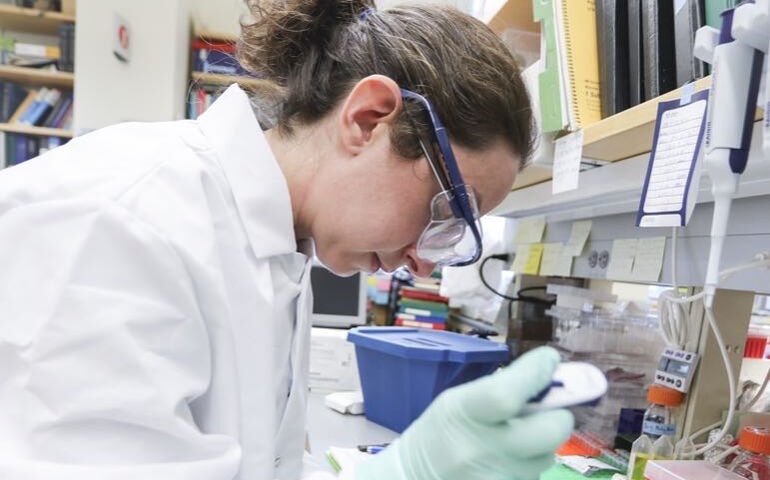Processing Your Payment
Please do not leave this page until complete. This can take a few moments.
- News
-
Editions
View Digital Editions
Biweekly Issues
- December 1, 2025
- Nov. 17, 2025
- November 03, 2025
- October 20, 2025
- October 6, 2025
- September 22, 2025
- + More
Special Editions
- Lists
- Viewpoints
-
Our Events
Event Info
Award Honorees
- Calendar
- Biz Marketplace
After two-year peak, Jackson Lab's grant funding drops to pre-pandemic levels
 Courtesy / Jackson Laboratory
Cancer, ALS and rare diseases are among the research projects underway at Bar Harbor-based Jackson Laboratory.
Courtesy / Jackson Laboratory
Cancer, ALS and rare diseases are among the research projects underway at Bar Harbor-based Jackson Laboratory.
More Information
After a two-year peak fueled in part by COVID-related research, the Jackson Laboratory’s grant funding in 2023 dropped 30% to an estimated $103 million.
In 2022, the nonprofit biomedical research institute, based in Bar Harbor, received $142 million in grant funding. In 2021, the lab's record haul was $152 million.
Factors contributing to the drop included fewer COVID-related research grants, according to JAX. From 2020 through 2022, the lab received 23 COVID-related grants, with 2021 having the most — 13 awards totaling over $4.2 million — and 2022 having the least with three awards.
There were additional factors contributing to the drop, the lab said.
- In 2023, there were four fewer senior faculty members, despite an overall increase in employment.
- In 2022, one large grant renewal was significantly cut, by nearly $8 million, by the National Institutes of Health.
In 2020, the Jackson Lab took in $120 million in funding, and in 2019, $110 million.
The 2023 grants resulted in 95 awards. That was also a decrease, based on the same factors, compared with 104 grants in 2022, a peak of 128 in 2021, 106 in 2020 and 101 in 2019.
However, the lab’s grant success rate of 39% through the third quarter of the year was higher than the overall National Institute’s of Health success rate of 22.9% in 2022.
The money, going to diverse research areas, came from federal programs, foundations and other external sources to support research and education programs.
Research highlights
Highlights for 2023 included research breakthroughs and faculty and leadership appointments, according to a news release. Throughout the year, the lab’s research was featured in several “high-impact” and scientific peer-reviewed journals, including Nature and Cell.
The 2023 funding included:
- A five-year, $4.5 million award to continue development of “patient-derived xenograft models,” which means that patient tissue, normally tumor, is transplanted from a human patient into a mouse to maintain as a model. Data from the model will go to the PDX Net Data Commons and Coordinating Center, a National Cancer Institute program established to coordinate collaborative, large-scale development and pre-clinical testing of targeted therapeutic agents in patient-derived models to advance the vision of cancer precision medicine.
- A project to suppress the cancer-fighting immune response.
- A $2.5 million award related to developing a profile of healthy, aging breast tissues as well as breast tumors, to aid in developing new approaches for breast cancer detection, intervention and prevention.
- A project related to understanding how a certain protein dysfunction can lead to neurodegenerative diseases, including amyotrophic lateral sclerosis.
- A five-year, $1.7 million award to continue studies of the genomic risk variants in cleft lip and cleft palate.
- A $22.8 million to advance preclinical genome editing work for rare neurological diseases.
- A two-year, $6 million award for research into Alzheimer’s and other neurodegenerative disease.
- Projects exploring the range of COVID-19 severity and long-term changes to the immune system that might help explain aspects of long COVID.
- A five-year, $2.4 million grant to fund efforts in understanding the cellular and genetic mechanisms of autoimmune diabetes associated with neuritis, a condition caused by inflammation of a nerve or nerves.
- An analysis of gut microbiomes and blood metabolites in short- and long-term myalgic encephalomyelitis, also known as chronic fatigue syndrome, with the goal of finding diagnostics and therapies.
Program and infrastructure growth
The lab was awarded $3.5 million in congressionally directed spending to help modernize mouse room facilities on the Bar Harbor campus, benefiting research and the broader biomedical community. The award was supported by U.S. Sen. Susan Collins, R-Maine.
The modernization project will include refurbishments and renovations to existing spaces, such as finish upgrades — wall paint, flooring, ceilings, etc. — ventilation improvements and replacement of infrastructure and equipment, Catherine Longley, the lab’s executive vice president and COO, told Mainebiz.
“All of these changes will create modern research animal facility holding and procedure rooms and improve the environments for both the research mice and JAX employees,” Longley said.
The design phase is scheduled begin in early 2024 and construction is expected to be completed in 2026.
In 2022, JAX established a Rare Disease Translational Center. The center’s mission is to develop partnerships, innovation, precision engineering and scaled pre-clinical pipelines to bring targeted therapies from lab to clinic swiftly and effectively.
In the nearly two years since the center was established, it has grown significantly, adding 23 new employees and supporting over 40 collaborations with rare disease patient foundations, academia and biotech.
One example is a collaboration with Actio Biosciences a biotech startup working with the center to engineer representational rare disease mouse models in order to more accurately vet potential therapeutics.
In addition, the JAX genomic education team released two online courses in the past year — “Exploring Rare Disease Through Translational Research” and “The Complexity of Rare Disease.”
Five faculty members joined the staff at the lab’s Bar Harbor and Farmington, Conn., campuses, bringing the faculty total to 61. The leadership team also grew by five members. The included the addition of the lab’s inaugural chief data science officer, Paul Flicek, to build a global data science initiative, with the goal of enhancing the lab’s research and discovery enterprise and building a team of data scientists.
JAX facts
Of the Jackson Laboratory's 3,000 employees, 1,699 are in Maine, working at the lab’s campuses in Bar Harbor, Ellsworth and Augusta. In addition, there are 250 visiting faculty, scientists, students and contractors working on JAX campuses in Maine.
Since 2015, the number of employees on Maine campuses has increased by 29%, or 355 employees, and total salaries paid to Maine workers has increased by 52%, or $38 million.
In 2022, the total economic contribution of JAX operations in Maine was estimated at $424 million in sales, $312 million in total earnings, and 4,130 total jobs. JAX revenues and employment are at their highest level on record.
Jackson Lab employees in Maine live in 140 towns and 15 counties around the state and earn an average salary of $69,700, 28% higher than the statewide average.
JAX paid 590 Maine-based vendors in 116 communities almost $60 million.
Mainebiz web partners
Related Content

The Giving Guide
The Giving Guide helps nonprofits have the opportunity to showcase and differentiate their organizations so that businesses better understand how they can contribute to a nonprofit’s mission and work.
Learn More
Work for ME
Work for ME is a workforce development tool to help Maine’s employers target Maine’s emerging workforce. Work for ME highlights each industry, its impact on Maine’s economy, the jobs available to entry-level workers, the training and education needed to get a career started.
Learn More
Groundbreaking Maine
Whether you’re a developer, financer, architect, or industry enthusiast, Groundbreaking Maine is crafted to be your go-to source for valuable insights in Maine’s real estate and construction community.
Learn more-
The Giving Guide
The Giving Guide helps nonprofits have the opportunity to showcase and differentiate their organizations so that businesses better understand how they can contribute to a nonprofit’s mission and work.
-
Work for ME
Work for ME is a workforce development tool to help Maine’s employers target Maine’s emerging workforce. Work for ME highlights each industry, its impact on Maine’s economy, the jobs available to entry-level workers, the training and education needed to get a career started.
-
Groundbreaking Maine
Whether you’re a developer, financer, architect, or industry enthusiast, Groundbreaking Maine is crafted to be your go-to source for valuable insights in Maine’s real estate and construction community.
ABOUT
NEW ENGLAND BUSINESS MEDIA SITES
No articles left
Get access now
In order to use this feature, we need some information from you. You can also login or register for a free account.
By clicking submit you are agreeing to our cookie usage and Privacy Policy
Already have an account? Login
Already have an account? Login
Want to create an account? Register
Get access now
In order to use this feature, we need some information from you. You can also login or register for a free account.
By clicking submit you are agreeing to our cookie usage and Privacy Policy
Already have an account? Login
Already have an account? Login
Want to create an account? Register










0 Comments